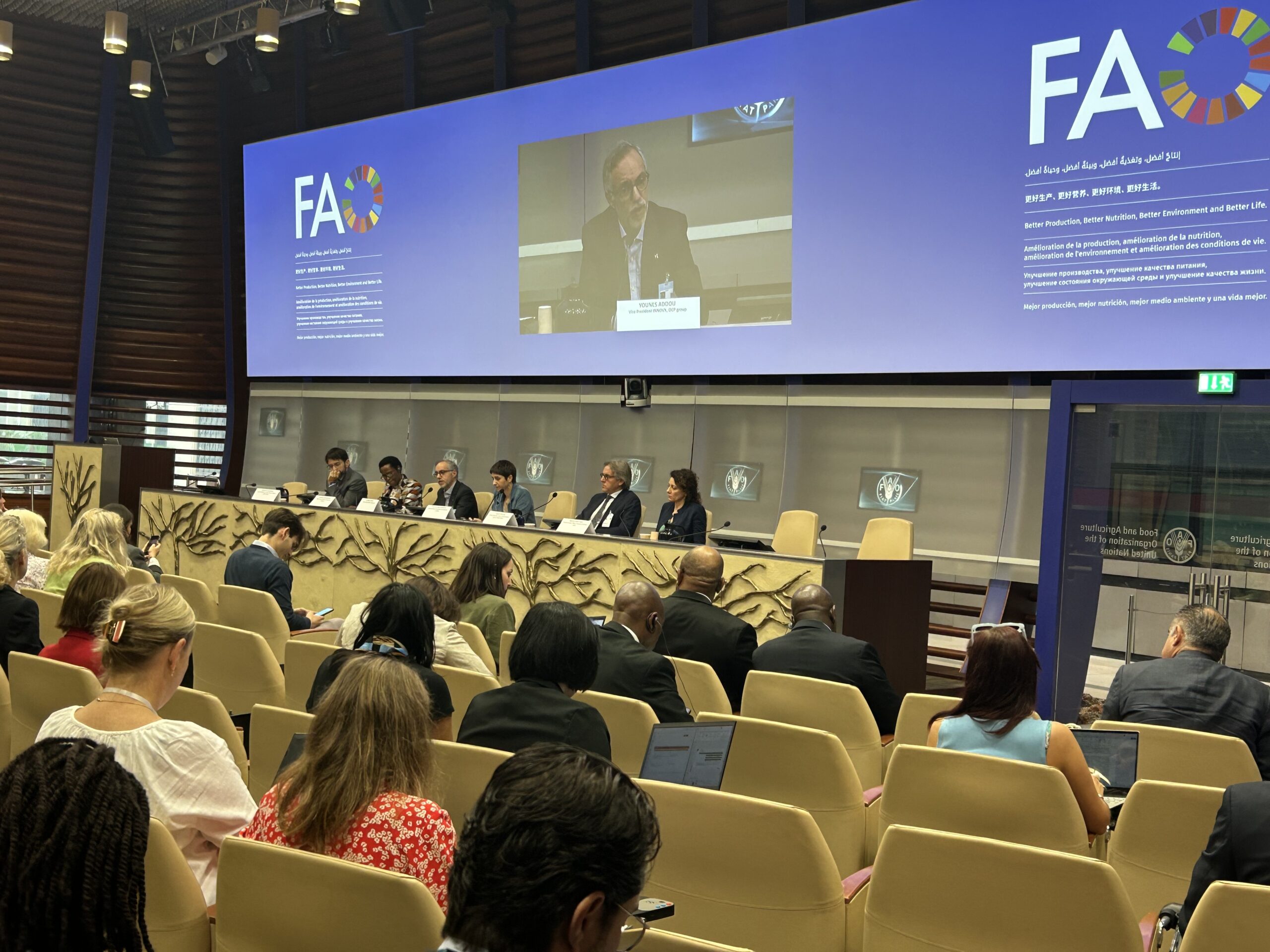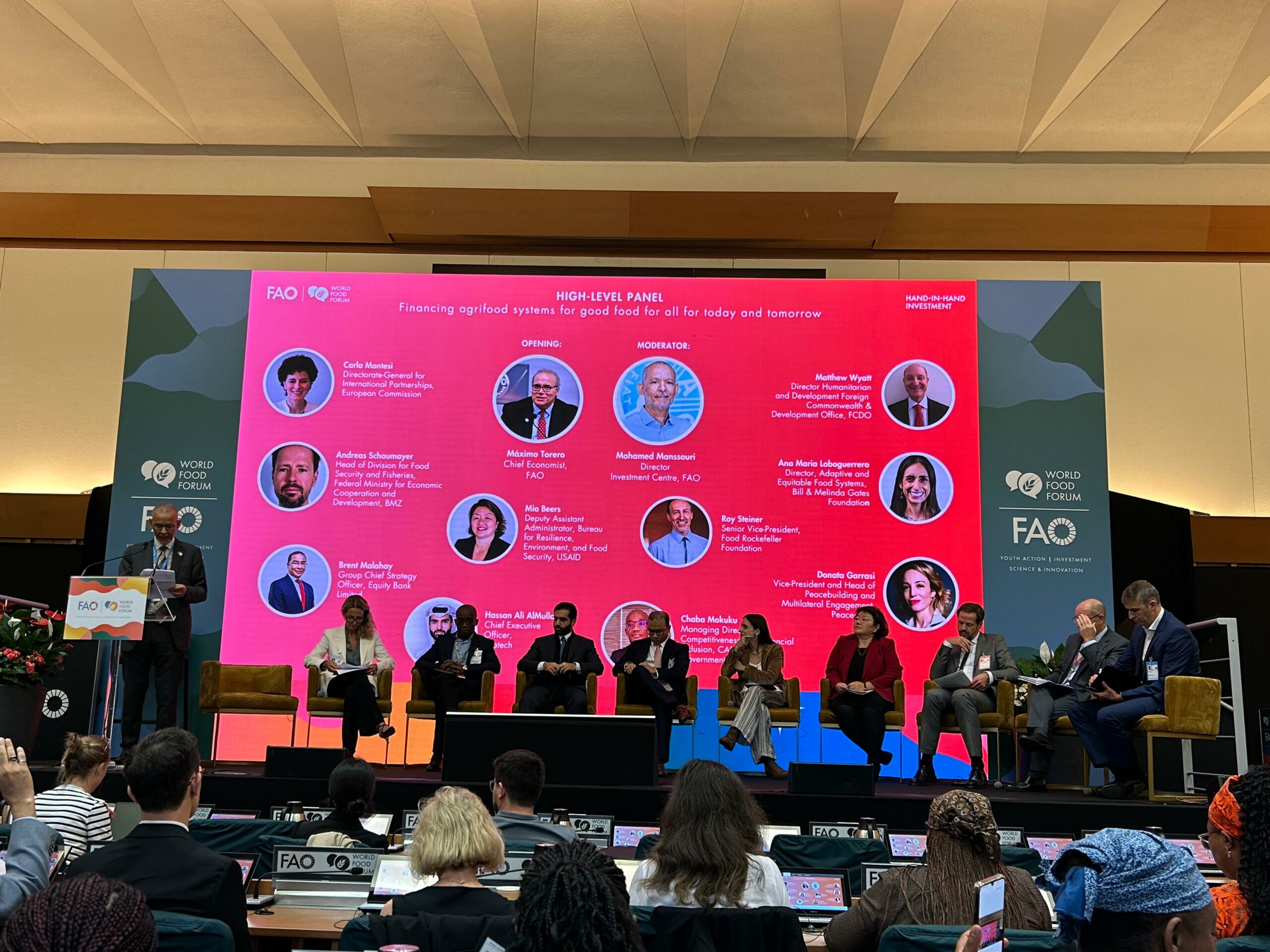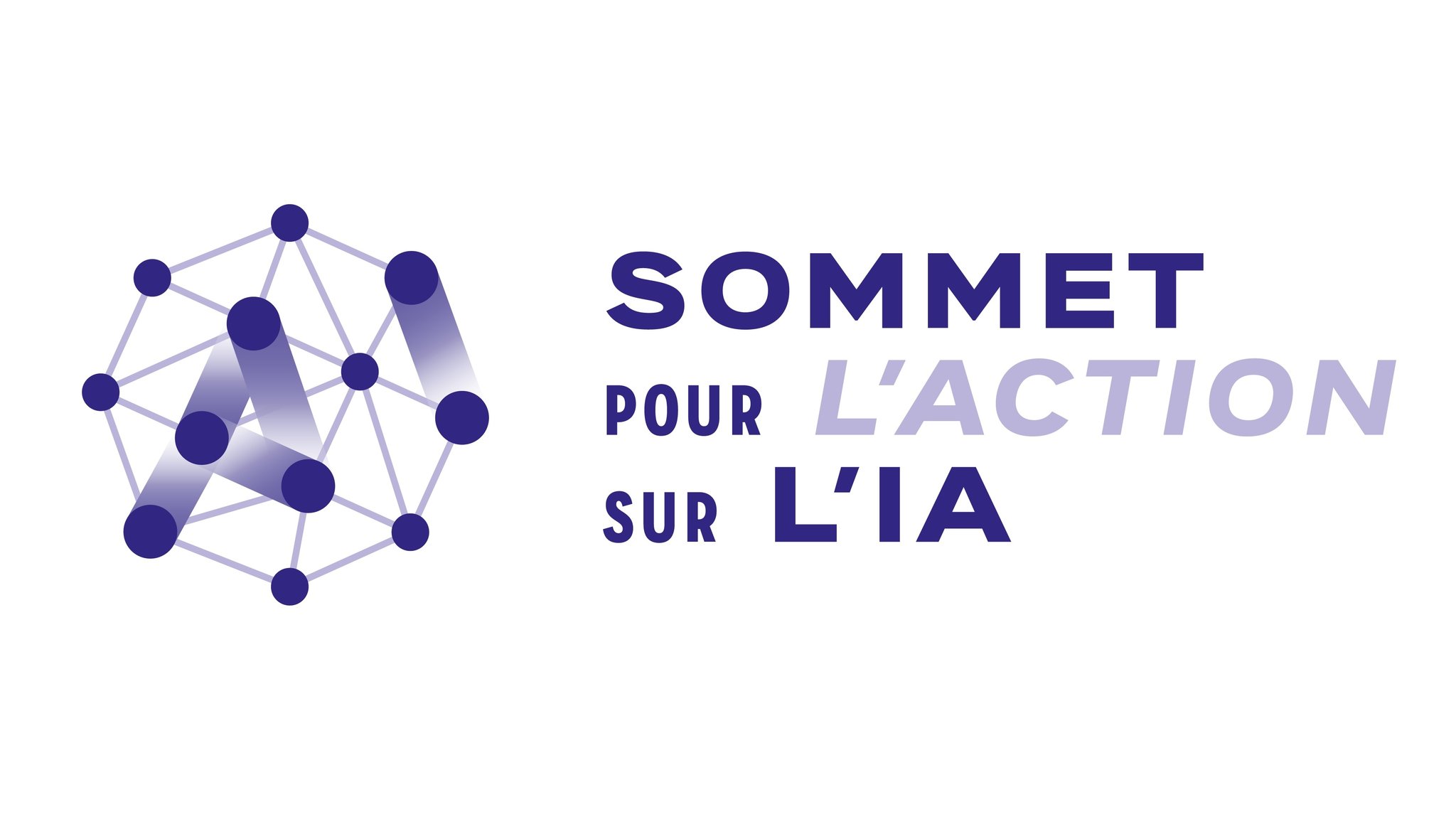The International Financial Architecture – Improving Collaboration and Scale to Bridge the Funding Gap for Sustainable Food Systems and Family Farmers
| This panel brought together esteemed experts from international organizations and financial institutions to discuss strategies for enhancing collaboration and scaling efforts to address the financing gap in sustainable food systems and support for family farmers.
This side event was co-organized by ECDPM, IFAD, EAFF, Brazil, the World Bank, the Paris Peace Forum, the Alliance for a Green Revolution in Africa, the Africa Europe Foundation, Mohammed VI Polytechnic University, the World Rural Forum, and the International Union for the Conservation of Nature (IUCN), during the 52nd Plenary Session of the Committee on World Food Security (CFS 52). The panel underscored the need for innovative financing models, improved data collection, derisking initiatives, and enhanced collaboration through partnerships to bridge the funding gap for sustainable food systems and smallholder farmers, particularly in Africa. |
The following speakers took part in the discussion:
- Renato Godinho, Special Advisor for International Affairs, MDS, Brazil, ministry of Foreign Affairs – global alliance against hunger & poverty.
- Nadia Martinez, Technical Lead at IFAD
- Vasco Molini, Senior Economist in the Poverty Practice group at the World Bank
- Younes Addou, OCP
- Cesare Kantarmaa, Chair of Rwanda’s farmers trade union INGABO
Keynote: Renato Godinho (Special Advisor for International Affairs, MDS, Brazil)
Renato Godinho expressed gratitude to IFAD for organizing the event and emphasized the significance of the Global Alliance Against Hunger and Poverty (GAAHP), an initiative led by President Lula as Brazil takes on the G20 presidency. He identified the G20 as the ideal platform for addressing hunger and poverty, with the Alliance scheduled to launch at the G20 Leaders’ Summit on November 18.
Godinho outlined three pillars for the Alliance: political will, knowledge, and financial resources, stressing that it is not a new organization, but a matchmaking mechanism to coordinate efforts. The success of the Alliance will depend on collaboration among its members, as it aims to ensure that governments create enabling environments for financing initiatives rather than duplicating their work.
He highlighted Brazil’s experience in supporting family farmers through government procurement programs and market support mechanisms. Godinho also underscored the international financial architecture’s failure to prioritize hunger and poverty alleviation, citing that only 8% of official development assistance (ODA) is directed toward these issues, with an even smaller proportion allocated to food production and climate finance.
Nadia Martinez (Technical Lead, IFAD)
Nadia Martinez emphasized the critical role of financial information in addressing the challenges facing smallholder farmers. She noted that a very small portion of climate finance is reaching small farmers despite commitments made during the 2021 UN Food Systems Summit.
In response, IFAD has developed the 3FS tool, designed to monitor those commitments by looking at financial flows related to food systems at both country and global levels. This tool harmonizes food systems financing terminology, making it easier to track government budgets, official development assistance (ODA), and private sector flows.
Martinez also referenced IFAD’s ongoing work on its Rural Development Report, which is set to launch in 2025. The report will explore how food systems are central to rural transformation and the need for better monitoring and financing to support sustainable rural development.
Vasco Molini (Senior Economist, Global Practice, World Bank)
Vasco Molini discussed the World Bank’s efforts to address data gaps in agricultural statistics, particularly in sub-Saharan Africa, through the “50×2030” initiative, a partnership with the FAO, IFAD, and the World Bank. This initiative aims to reduce data gaps in 50 countries by 2030, enabling better evidence-based policymaking.
Molini emphasized that financial resources alone are insufficient to drive change. Countries need to take ownership of their data and policies, enabling them to tap into local resources and capacities. He highlighted a $1 billion World Bank project focused on improving statistical capacity in Western Africa and stressed the need for continued technical assistance from Rome-based agencies to support this work.
Cesare Kantarama (Chair, Rwanda’s Farmers Trade Union INGABO)
Cesare Kantarama highlighted the challenges farmers face in being excluded from decision-making processes, despite agriculture’s critical role in national economies and food systems. INGABO’s mission is to strengthen the technical and economic capacities of farmers, working in collaboration with Rwanda’s Ministry of Agriculture, the private sector, and international organizations such as the European Union and the World Farmers’ Organization.
Kantarama stressed the need for farmers to be directly involved in financial decisions. While INGABO successfully negotiated a reduced interest rate of 18% for farmers, she noted that more can be done to ensure that financial mechanisms align with farmers’ needs. She also called for more direct financing to ensure projects can be implemented effectively, without the restrictive conditions that often accompany indirect funding.
Younes Addou (OCP)
Younes Addou outlined OCP’s initiatives to improve financing for smallholder farmers in Africa. He highlighted OCP’s partnership with the IFC to create the Agrifinance platform, which aims to de-risk agricultural value chains by leveraging risk-sharing facilities and interest rate programs for smallholders.
Younes Addou emphasized the importance of data collection in unlocking financing for small farmers and detailed OCP’s support for startups in agritech and fintech to improve access to both data and finance. He also pointed out that agriculture and climate are interconnected, highlighting OCP’s promotion of biochar as a means of enabling access carbon credits.
Younes Addou concluded by emphasizing that Africa is the key to addressing global food security and climate challenges. OCP is committed to fostering partnerships with public, private, and philanthropic organizations, and foundations, with the aim of creating an investment-friendly environment for African agriculture. In a non-competitive but rather collaborative approach, he emphasized OCP’s openness to new partners.
If you would like to discuss the political situation further and understand what impact it will have on the business climate and macroeconomic framework, as well as on regional and international policy, please do not hesitate to contact us.
We help our clients navigate political and financial dynamics from local to global.





